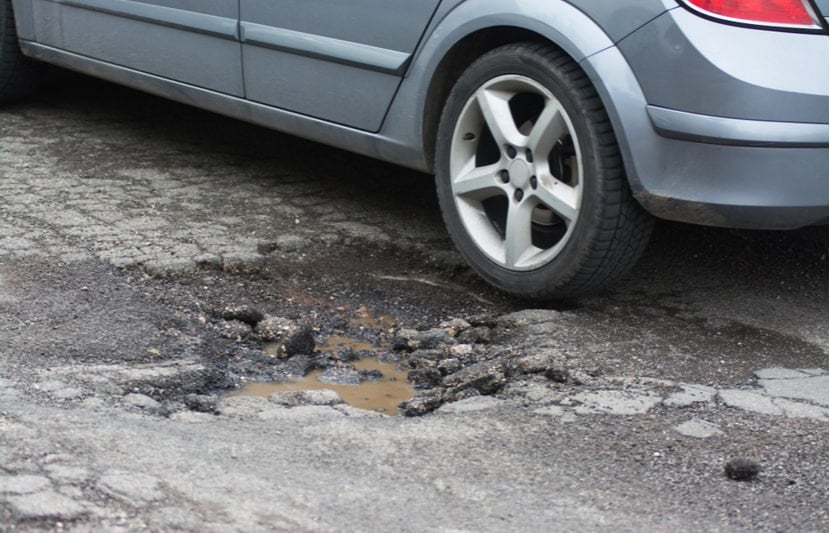If your car has been damaged by a pothole, you might be able to claim from your local council or car insurance company. Here we look at how you can make a pothole claim and help you find out who’s responsible for the damage.

New fund to help fix the UK’s pothole problem
The chancellor of the exchequer has announced a new £200 million fund to help fix the UK’s pothole problem as part of the budget announcement.
This is good news for motorists and cyclists. According to the Local Government Association (LGA), around 60% of people have noticed the condition of their local roads deteriorating.
But the LGA reports that £200 million may not be enough to cover the backlog of pothole damage. The cost of repairing potholes has increased by 22% due to inflation and a shortage of bitumen, which is a key ingredient of tarmac.
The organisation said it could fill over 4 million extra potholes next year if the government meets the additional costs faced by councils.
The LGA says:
“Despite the efforts of councils, which repair a pothole every 19 seconds, our local road repair backlog is rising. Latest estimates show it would take over £12 billion and 9 years to clear.
“This coupled with soaring inflation is making it increasingly harder for councils to keep our roads in good condition.”
What our motor insurance expert says
“The cold snap of this winter has brought heavy rain and freezing temperatures, creating a perfect storm for many more potholes on roads. As the chancellor announces a new budget for fixing potholes, it’s great that motorists will be facing less pothole damage and roads will be safer.
“Motoring costs are just one of the current financial challenges we’re facing. And many don’t know that if your car does face pothole damage, you could make a claim for it, rather paying for the repairs.”

Who's responsible for pothole damage to my car?
Local authorities are usually responsible for pothole damage. They have a responsibility to maintain roads in their area.
Roads that cross several authority areas, such as motorways and A-roads, come under the charge of:
- England: Highways England
- Northern Ireland: Department for Infrastructure
- Scotland: Transport Scotland
- Wales: Traffic Wales
If your car is damaged as a result of running over a pothole, your local authority or one of the 4 national authorities could be liable.
But if your car is damaged due to other debris on the road, you aren’t entitled to compensation. For this, you need to make a claim on your car insurance policy.
How do I make a pothole claim?
To make a successful pothole claim, you need to show evidence of pothole damage to your car. Here’s what you need to do:
- Check the damage caused by the pothole
- Gather evidence
- Report the pothole
- Get a mechanic to confirm pothole damage and get repair quotes
- Submit your pothole claim
1. Check the damage caused by the pothole
The damage caused by driving over a pothole often depends on the speed you were travelling.
The faster you were driving, the greater the potential damage. As soon as you're aware that a pothole may have damaged your car, find a safe place to pull over.
See if there’s any visible pothole damage to your wheels and tyres. While you’re driving you also need to pay attention to:
- Whether the car is making any vibrations
- How the steering feels
- Whether the car is veering to one side
If there are any problems, get your car to a garage or tyre centre as soon as possible.
2. Gather evidence
You need to show the local authority pictures of the pothole. If you’re returning after the incident to take photos, bring a measuring tape and use that to show its size.
If that’s not an option, placing an everyday object you have like a shoe or bag can give a good indication of scale.
It’s also important to make a note of:
- The date and time of the incident
- Any witnesses and their contact details
- The location of the pothole on the road
- The damage to your car
- If you visit a garage and more damage is revealed
3. Report the pothole
You need to tell the body responsible for maintaining the road about the pothole.
For local roads, B roads and minor A roads that’s likely to be the local authority. To find the right council, use the report a pothole tool on the government website.
For more major roads you have to report it to the relevant national authority.
Even if you don’t make a claim or your car isn’t damaged it still makes sense to report potholes.
What counts as a pothole?
A pothole is usually classified as a pit in the road that’s 40mm or around 1 and a half inches deep and 300m wide (just under a foot). Most councils use this sort of classification to determine a pothole.
If the hole has smaller dimensions than this it's probably classified as a ‘carriageway defect’, which is the same thing, just under a different name.
The Asphalt industry Alliance reckons the number of potholes in the UK is around 1.7 million in 2021-2022 - the same figure as 2020-2021.
4. Get a mechanic to confirm pothole damage and get repair quotes
Ask the mechanic to confirm the cause of the damage in writing. You need this to be able to make your pothole claim from the local authority.
It’s also worth getting quotes from at least 3 garages. Keep a record of each one and go with the cheapest.
Showing willingness to keep repair costs down could help your pothole claim.
5. Submit your pothole claim
If you’re intent on making a claim for pothole damage, contact the local authority you reported the pothole to.
Make it clear that you’re looking to make a claim for pothole compensation and pass on:
- A full description of the incident
- When and where it happened
- What you’ve done since to address the damage to your car
Don’t forget to include:
- Copies of photos
- Witness details
- Confirmation of pothole damage from the mechanic
- Quotes
- Repairs for damage
- Any other details that could help your claim
Your right to pothole compensation has limits. You need to prove that the local authority failed in its duty to maintain the road, in accordance with Section 58 of the Highways Act 1980.
What happens after I've made a pothole claim?
The local authority is under an obligation to respond to any claim lodged with them within 30 days. If they don’t, contact them again via the complaints department.
Chances are they‘ll get back to you with one of the following reactions:
- The authority accepts your claim and covers all your repair expenses. It probably won’t stretch to additional expenses such as alternative transport.
- The authority offers a partial settlement.
- The authority rejects the claim in its entirety.
If the local authority offers a partial settlement, you can counter offer.
Reaffirm the costs you’ve incurred directly as a result of the incident, and show that you’ve shopped around for the cheapest repairs.
What if my pothole claim is rejected?
If your pothole claim is rejected, you have a few options. Either:
- Accept the rejection
- Take the authority to small claims court
- Claim on your car insurance policy
- If the damage to your car is little more than a burst tyre, you could accept the rejection and pay for repairs yourself
But what if your catalytic convertor was scrapped, or the undercarriage rendered irreparable? The costs involved are likely to be high enough to warrant further consideration.
Taking the authority to small claims court is an option, but it's not cheap. If you decide to go down this route, it's worth getting independent legal advice.
You could put in a Freedom of Information Act request to establish whether the council actually inspected the site. They’re required to do so, but might not have.
If the court route doesn’t appeal – and it can be pricey if you use a lawyer and lose – you could claim on your car insurance policy.
Note this is likely to be considered an ‘at-fault’ claim, and most likely impact your no-claims discount and future insurance costs.
Compare car insurance quotes
When can't I claim for pothole damage?
Your claim for pothole damage is likely to be rejected if:
- It was actually the result of debris on the road
- If the pit in the road wasn't large enough to be considered a pothole
You might still be able to claim on your car insurance. But if the damage is only minor it might be worth paying for the pothole damage yourself.
How likely is it that my pothole claim will be accepted?
The likelihood of your claim being accepted ultimately depends on the strength of your case and the evidence that you present.
But if you reported the pothole and have evidence that the damage was the result of driving over it, your claim should be accepted.
You might need to be patient though, as some claims could take months to resolve. You might also need to be persistent if you’re only offered a partial settlement or you think your claim has been incorrectly rejected.








